(1) CITY TECH SF SYMPOSIUM. The Program and Registration for the 8th Annual City Tech Science Fiction Symposium on Science Fiction, Gender, and Sexuality will be held on Thursday, November 30, 2023 from 9:00 a.m.-5:00 p.m Eastern (GMT/UTC -5 hours) online via Zoom Webinar.
To participate in this free event, attendees will need to do these two things: (1) Signup for a free Zoom account here (if you don’t already have one), and (2) Register here to receive access instructions to the Zoom Webinar. Participants may register any time before or during the event!
For those who would like to watch the event without registering, you can join the YouTube Livestream here (click on the top-most video labeled “Live”).
One of the sessions will include these papers:
2:15-3:05pm:
Paper Session 4
Moderator -Leigh Gold
Omotoyosi Odukomaiya – Identity, Otherness and Alterity in Nnedi Okorafor’s Lagoon and Tade Thompson’s Rosewater
Nikki Paige Gallant – Romantic Disability Studies: The Female Cyborg in Samuel Taylor Coleridge’s “Christabel”
Jacob Adler – Speculative Fiction and the “Illusory Woman”
Jo Ann Oravec – You May Now Kiss the Robot: Human-Robot Marriages in Science Fiction Literature and Movies
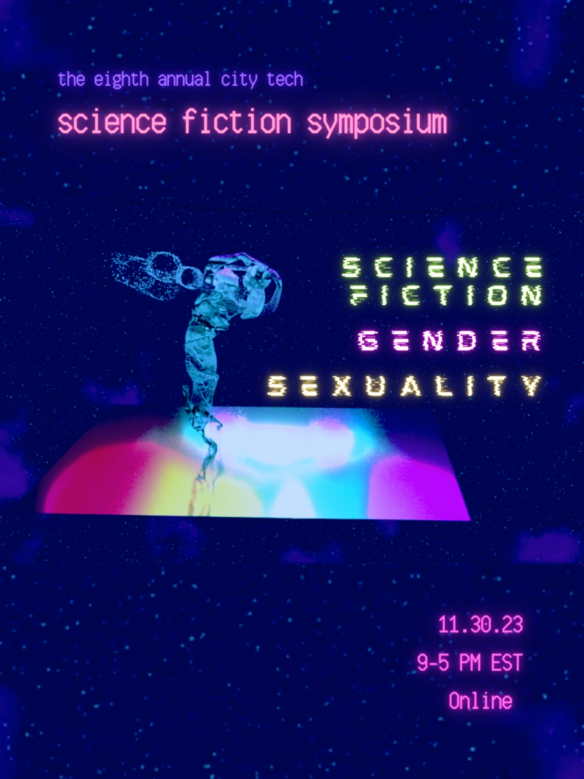
(2) TREASURED CHESTS. Adam Roberts begins by reminding readers how Robert E. Howard wrought the original Conan before dryly passing judgment on Robert Jordan’s continuation of the series and its infinite breast references. When Roberts says the “writing throughout is of the calibre one would expect from the author of The Wheel of Time” it is not meant as flattery. “Robert Jordan, ‘The Conan Chronicles: 2’ [‘Conan the Magnificent’ (1984); ‘Conan the Triumphant’ (1983); ‘Conan the Victorious’ (1984)”.
…Conan often swears by ‘Crom’, his god; but Crom is a much more Lovecraftian deity than (say) Thor or Ares:
“Conan’s gods were simple and understandable; Crom was their chief, and he lived on a great mountain, whence he sent forth dooms and death. It was useless to call on Crom, because he was a gloomy, savage god, and he hated weaklings. But he gave a man courage at birth, and the will and might to kill his enemies, which, in the Cimmerian’s mind, was all any god should be expected to do.” [Howard, ‘The Tower of the Elephant’ (1933)]
It is splendid, and it lifts the adventuring out of the banality wish-fulfilment. Going through the stories I was struck by how powerful and memorable they are.
+++
From, as they say, the sublime to the ridiculous. Having read Howard I was curious as to how his various continuers compared. They did not, constant reader, compare well….
(3) FACES SHOULD BE RED, NOT JUST THE PLANET. Ars Technica reviewer Chris Lee hears a discouraging word about colonizing Mars: “A City on Mars: Reality kills space settlement dreams”.
Let me start with the TLDR for A City on Mars. It is, essentially, 400 pages of “well, actually…,” but without the condescension, quite a bit of humor, and many, oh so many, details. Kelly and Zach Weinersmith started from the position of being space settlement enthusiasts. They thought they were going to write a light cheerleading book about how everything was going to be just awesome on Mars or the Moon or on a space station. Unfortunately for the Weinersmiths, they actually asked questions like “how would that work, exactly?” Apart from rocketry (e.g., the getting to space part), the answers were mostly optimistic handwaving combined with a kind of neo-manifest destiny ideology that might have given Andrew Jackson pause.
The Weinersmiths start with human biology and psychology, pass through technology, the law, and population viability and end with a kind of call to action. Under each of these sections, the Weinersmiths pose questions like: Can we thrive in space? reproduce in space? create habitats in space? The tour through all the things that aren’t actually known is shocking. No one has been conceived in low gravity, no fetuses have developed in low gravity, so we simply don’t know if there is a problem. Astronauts experience bone and muscle loss and no one knows how that plays out long term. Most importantly, do we really want to find this out by sending a few thousand people to Mars and hope it all just works out?
Then there are the problems of building a habitation and doing all the recycling. I was shocked to learn that no one really knows how to construct a long-term habitable settlement for either the Moon or Mars. Yes, there are lots of hand-wavy ideas about lava tubes and regolith shielding. But the details are just… not there. It reminds me of Europe’s dark days of depositing colonies on other people’s land. The stories of how unprepared the settlers were are sad, hilarious, and repetitive. And, now we learn that we are planning for at least one more sequel….

(4) NEGATORY GOOD BUDDY. Far Out Magazine found the tablets listing “Ayn Rand’s 13 commandments for making capitalist movies”. Every one starts with the word “Don’t”.
…An often-revered, equally maligned philosopher and unashamed champion of capitalism, Ayn Rand managed to weave her steadfast and forthcoming ideology into her works as an artistic writer. As a capitalist, Rand’s novels The Fountainhead and Atlas Shrugged mirrored her belief in individualism and the pursuit of material gain….
…When it came to creating pro-capitalist movies, Rand felt that there were specific criteria that directors and writers ought to stick to and in 1947, she wrote the ‘Screen Guide for Americans’, a pamphlet that was meant to heighten awareness in Hollywood studio producers of a growing pro-communist sentiment.
“The purpose of the Communists in Hollywood,” she wrote, “Is not the production of political movies openly advocating Communism. Their purpose is to corrupt our moral premises by corrupting non-political movies — by introducing small, casual bits of propaganda into innocent stories — thus making people absorb the basic premises of Collectivism by indirection and implication.”…
The 13 commandments are at the link.
(5) WHO REMEMBERS. “’I made the Daily Mail incredibly angry’: stars share their Doctor Who moments – part five” in the Guardian.
Juno Dawson (writer of the Doctor Who: Redacted audio series, 2022 onwards)
When Tegan Jovanka leaves the Doctor, she tells him she can no longer witness the bodies piling up around them. “It’s stopped being fun, Doctor!”, she wails. I often apply that rule to my life, too. If it stops being fun, get out. Some 20 years later, Martha Jones chooses herself over a life of pining after the Doctor. She explains about her university friend’s unrequited love for their flatmate. Martha won’t repeat her pattern, and she gets out. It’s one of the most explicitly feminist moments in the show.”
(6) D.G. COMPTON (1930-2023). Sff writer D.G. Compton, winner of the 2021 Cordwainer Smith Rediscovery Award, died November 10 reports the Arrowhead SF Foundation.

We received sad news today that David Guy Compton, who wrote as D. G. Compton, passed away this morning at the age of 93 where he had lived in Maine for many years. David was born in London, England in 1930 and moved to the US some years later.
We had the great pleasure of having David visit us in Milford for the Black Bear Film Festival the year DEATH WATCH, the 1979 Bertrand Tavernier film based on his book, THE CONTINIOUS KATHERINE MORTENHOE was featured on the main stage. It was a delightful and memorable weekend.
D. G. Compton was always writing, with his most recent novel, SO HERE’S OUR LEO, being published by Wildside Press in April of 2022. Besides THE CONTINIOUS KATHERINE MORTENHOE – an “author’s cut” of which was published by NYRB Classics in 2016 — his many wonderful titles include THE STEEL CROCODILE, FAREWELL EARTH’S BLISS, and SYNTHAJOY, as well as numerous crime novels written as Guy Compton and gothic romances as Frances Lynch. David was also an authority on stammering, writing a nonfiction book on the subject, STAMMERING: ITS NATURE, HISTORY, CAUSES AND CURES.
David was awarded the 2021 Cordwainer Smith Rediscovery Award and was also honored as the Science Fiction and Fantasy Writers Association’s Author Emeritus in 2007. He is survived by his step son, Toby Savage and many friends. We will greatly miss him.
The best way you can honor David Compton is to go read one of his books.
(7) TODAY’S BIRTHDAYS.
[Written by Cat Eldridge.]
Born November 26, 1919 — Frederik Pohl. (Died 2013.) He’s one of those writers that I’ve always found I can depend upon for an excellent reading experience. So let’s take a look at him. Now keep in mind this is only about him as a writer, not as an editor.
Eighty-six years ago when he was just eighteen, “Elegy to a Dead Satellite: Luna”, a poem, was his published work in Amazing Stories in the October 1937 issue as Elton Andrews. His first piece of prose fiction was the first part of “Head Over Heels in Time” published in the Spaceways fanzine, February 1939.
Now let’s get to his novels. Looking him on ISFDB was interesting to say the least. I’ve reading him for around a half century now so naturally I didn’t remember everything that I’d read by him.
I’ll confess that sometimes all I remember of a novels is the cover art but that then triggers enough to tell me if I liked it. And so it with Cuckoo series. Not bad at all they were. Speaking of their cover art, I’m particularly fond of the pulpish artwork for Wall Around A Star.
However the novels that defined him as a writer are those of the Heechee series. Yes, I’ve read the first three novels several times and enjoyed them immensely. Can we not talk about The Annals of the Heechee which I did read? Just once which was enough.
And I’ve not read The Boy Who Would Live Forever, so opinions on it are hereby solicited.
Gateway won a much deserved Hugo at IguanaCon II, as well as John W. Campbell Memorial Award and a Nebula.
Ahhh, Man Plus which was a nominated first a Hugo at SunCon, and won a Nebula. What an amazing novel it is. ISFDB lists a sequel, Mars Plus, which I had no idea existed until now. Who’s read it?
The Space Merchants written with Cyril M. Kornbluth that first was published in Galaxy Science Fiction magazine as the serial Gravy Planet is truly great in a silly sort of way. It has a sequel, The Merchants’ War, I’ve managed to overlook all this time. There really is too much fiction out there.
Let’s finish off with The Cool War which I think is one of his best novels — fascinating characters, near setting, great story.
No, I didn’t cover his short stories as there’s really no way to break them out and do them justice. If you like his short works, some of which have won Hugos, there’s been some thirty collections published so far.
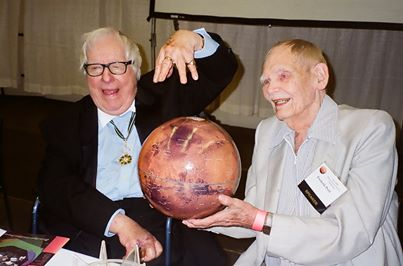
(8) COMICS SECTION.
- Thatababy has a very unsafe imaginary friend.
- Dog Eat Doug for November 26 is an Alien reference, too.
(9) DISK JOCKEY. Far Out Magazine’s list of “The 10 best-selling DVDs of all time” is composed entirely of sf and fantasy films – though that’s not the common denominator that caught the writer’s eye.
…Understandably, the entire list is made up of children’s flicks, or, at the least, movies targeted at younger audiences, with Disney being behind half of the films on the list, including the three Pixar movies The Incredibles, Cars and Finding Nemo, which sold a grand total of 77,500,000 DVD copies. In addition, Disney was also behind the first two movies in the live-action Pirates of the Caribbean series, with the Johnny Depp-led films selling over 32 million copies.
Elsewhere, there are two superhero movies on the list, one from Marvel and the other from DC. The 2008 Christopher Nolan film The Dark Knight sold 19,200,000 copies, just 300,000 under how many Sam Raimi and his team managed to shift for the Tobey Maguire-led Spider-Man film from 2002….
(10) ANIME EXPLORATIONS. Episode 14 of the Anime Explorations Podcast is up, and includes a Kumoricon 2023 Con Report. The podcast can be found here: “Anime Explorations Podcast: Episode 14: Tsukhime (2003)”.
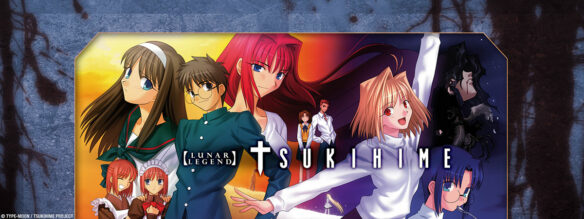
(11) GONE WITH THE WIND. “‘We are heartbroken’: Coober Pedy loses its famous drive-in – but the opal town has plans for take two” reports the Guardian.
The closure of a drive-in rarely makes the news but Coober Pedy’s is no ordinary drive-in. Since it was built by volunteers in 1965 it has served as a meeting point for the remote opal mining community, itself immortalised on film in The Adventures of Priscilla, Queen of the Desert and Mad Max Beyond Thunderdome. For decades miners turned up in their utes, still filled with mining equipment and gelignite. As beer was sold at the drive-in, the operators had to ban patrons from bringing along explosives.
But curtains have now closed on South Australia’s last drive-in after furious winds reaching almost 120km/h ripped through the town on 15 November, leaving the screen in tatters. More than half the panels and the underlying structure were ripped away by the wind.
“We are heartbroken as a community,” states the drive-in’s website….
(12) NOT TUNED IN. “Christopher Nolan names the genre he doesn’t ‘really get’” in Far Out Magazine. (Whew, I was worried for a second he might say sff, which would have really been disturbing after five Nebula Award nominations and a win for Inception.)
Yet, while Nolan is a considerable fan of all types of cinema, there is one genre he has admitted that he doesn’t “really get”, confessing that he has little love for the humble movie musical.
“I don’t really get musicals,” he told Scott Holleran, “I always used to say that I would do anything except musicals. Having said which, now that I have kids, I’m re-appraising that. There are a lot of films that [I saw] as a kid that I didn’t really remember as musicals. Like Willy Wonka and the Chocolate Factory. I completely forgot that it was a musical. I watched it again a few weeks ago and I saw it in a different way. I think as a kid you just accept the groundwork of the film you’re seeing, you’re not judging it as a genre, and you’re much more open”…
(13) FIFTY YEARS OF ZINES. Gothamist reports on a new exhibit at the Brooklyn Museum called Copy Machine Manifestos: Artists Who Make Zines in “Zines are back: Brooklyn Museum exhibit looks at decades of artistry”.
…It includes more than 800 images from the world of zines from the 1970s to today, organized into categories like “The Punk Explosion” and “Critical Promiscuity.”…
…Zines actually began in the 1930s, in mimeograph form. They were the same: cheap, quick, ephemeral and usually self-made publications, but they were related to fan culture.
They started around science fiction fandom, then moved into comic book fandom, then ultimately, in the early ’70s, moved into rock fandom.
There are fan communities that are interested in certain comics or certain types of music.
Part of the ethos of these fanzines is that they’re very open to reader feedback and participation. They welcome correspondence, they welcome contributions, they welcome mentioning other types of zines….
(14) LOSCON FANZINE TABLE. Richard Man took these photos of the fanzine table at this weekend’s Loscon.
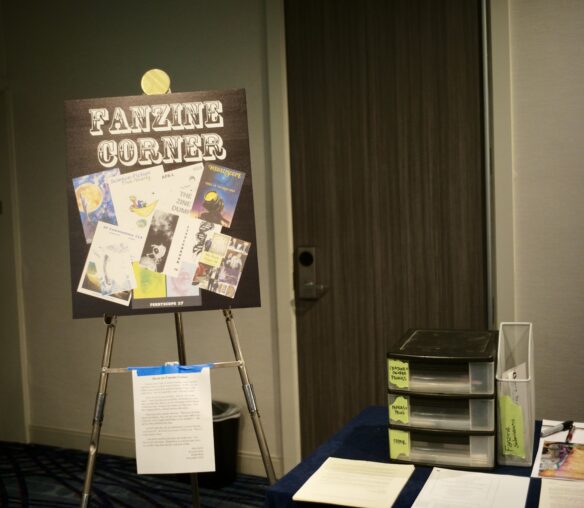
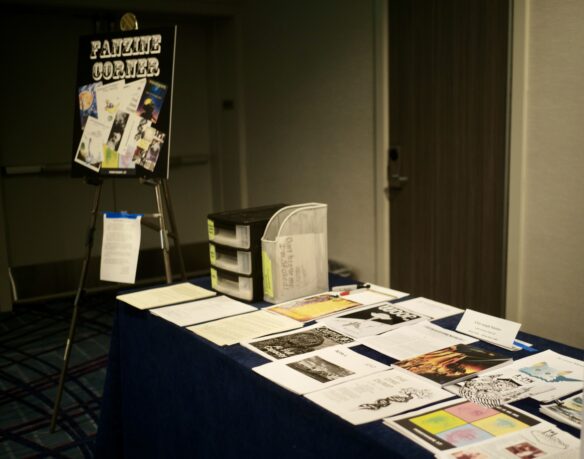
(15) VIDEO OF THE DAY. “Carrie Fisher Roasts George Lucas at AFI Life Achievement Award” in 2005. Four minutes in the fire and he’s well-done.
[Thanks to Andrew Porter, John King Tarpinian, Chris Barkley, Kathy Sullivan, Steven French, Alexander Case, Richard Man, Cat Eldridge, SF Concatenation’s Jonathan Cowie, and Mike Kennedy for some of these stories. Title credit belongs to File 770 contributing editor of the day Daniel Dern.]
